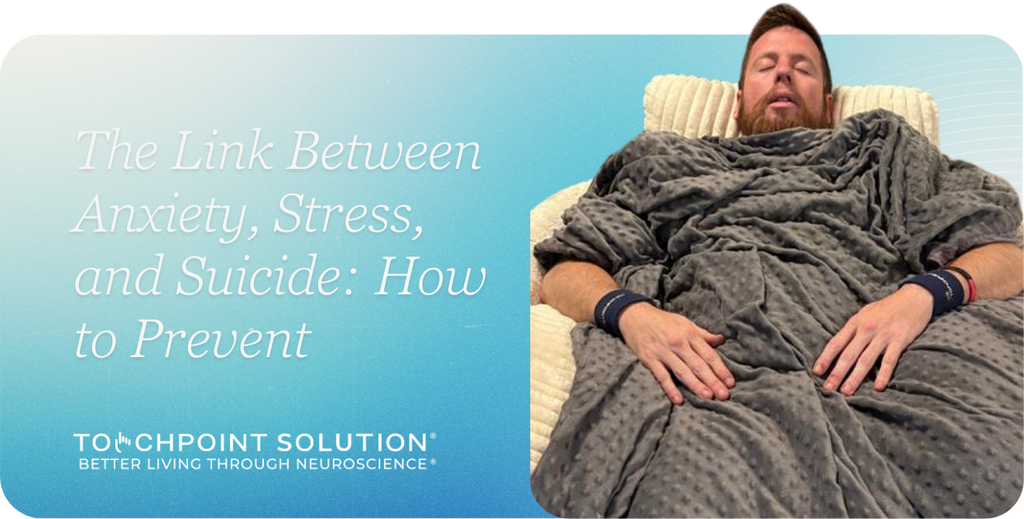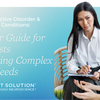The Link Between Anxiety, Stress, and Suicide: How to Prevent

For many people, anxiety and stress feel like constant companions. But for David, one of the individuals featured in our TouchPoints™ Case Studies, stress wasn’t just a bad day at work—it was a constant fight to stay grounded. Living with Post-traumatic stress disorder (PTSD) and C-PTSD, anxiety pushed him to ruminate on painful thoughts or slip into disassociation. These moments of disconnect made even ordinary tasks overwhelming. David reclaimed calm not through a one-time intervention, but through daily practice. His story shows how everyday tools can play a powerful role in suicide prevention.
David’s Daily Battle with Stress and Anxiety
Like so many others, David was caught in the cycle of rumination—replaying painful thoughts over and over. On top of that, disassociation often pulled him out of the present moment, making it difficult to stay focused at work or even engage in daily life. These symptoms not only drained his energy but also increased feelings of hopelessness.
That’s when he started using TouchPoints™ as part of his routine.
"I use TouchPoints daily, sometimes more if needed. I am more focused and calmer, and I spend less time ruminating."
David brought grounding and calm into his day with TouchPoints™, which allowed him to stop anxiety and stress from taking over. He managed what once felt overwhelming, and that shift kept him connected to his work, his relationships, and himself.
See David’s full case study here
Why Stress and Rumination Matter in Suicide Prevention
David’s experience shows a critical truth: unchecked stress and anxiety can heighten suicide risk. Research shows that people diagnosed with PTSD and other trauma-associated stress disorders face significantly higher rates of suicide mortality (NLM 2023).
Rumination, the constant replaying of negative thoughts, is a well-documented predictor of suicidal thinking (JAMA Psychiatry, 2023). Disassociation, meanwhile, can intensify feelings of detachment, making coping even harder.
This is why prevention cannot only focus on crisis moments but must extend beyond crisis hotlines and emergency care. People need daily strategies that regulate emotions, reduce stress, and build resilience long before emotions escalate.
Building Prevention into Everyday Life
David’s use of TouchPoints™ shows how proactive tools can fit seamlessly into daily routines. He wears them while working from home, activating them whenever stress rises. The gentle vibrations calm his nervous system and interrupt cycles of rumination, allowing him to stay focused and present.
This kind of regulation connects directly to the TouchPoint's Six Dimensions of Health:
- Mindfulness: By bringing him back to the moment, TouchPoints™ keep him from getting lost in spiraling thoughts.
- Healthy Thinking: A calmer body makes space for clearer, more balanced thinking.
- Sleep: With stress under control, rest becomes easier and more restorative.
- Healthy Relationships: Staying grounded allows David to connect with others instead of withdrawing.
These dimensions create a protective buffer, helping prevent escalation into crisis.
Who Can Benefit From This Approach
David’s journey reflects the struggles many faces silently. His story resonates with:
- Individuals at home who want a private, stigma-free way to manage daily stress.
- Therapists who integrate TouchPoints™ into sessions so clients can stay regulated during difficult conversations.
- First responders and other high-stress professionals who need discreet ways to manage stress in real time.
When people make stress regulation accessible and consistent, they practice prevention every day—not just in emergencies.
Suicide prevention starts with the everyday. Like David, you can take small steps to manage anxiety, calm your mind, and protect your well-being.
TouchPoints™ are simple, science-backed tools you can carry with you to regulate stress and stay connected—before a crisis ever arrives.
Try TouchPoints™ today and make prevention part of your daily routine.
-
Posted in
Anxiety, Emotional Well-being, Mental Health Tools, PTSD Support, Stress, Suicide Prevention




